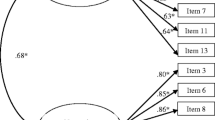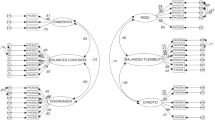Abstract
The main purpose of this study was to investigate the psychometric properties of the Beliefs about Children’s Adjustment in Same-Sex Families Scale (BCASSFS) (Frías-Navarro 2009), in terms of confirmation of internal consistency and dimensionality via confirmatory factor analysis. In addition, we set out to validate this scale using the Attitudes toward Lesbians and Gay Men (ATLG) Scale Cardenas and Barrientos (The Journal of Sex Research 45(2):140–149, 2008a). Finally, we divided our sample into categories with a view to creating a typology (Egalitarian, Normative opponents, Bigots, and Individual opponents). No research to date has confirmed the hypothesized factor structure of the BCASSFS in Latin American countries. Using data from a convenience sample obtained through the application of a survey of heterosexuals at a university in northern Chile (N = 283), a model of two correlated factors was used and the fit indexes obtained. The results indicate that the BCASSFS is a valid and reliable scale for measuring beliefs about children’s adjustment in same-sex families in Chile. Moreover, the findings indicated that responses to BCASSFS could be explained by two factors (individual opposition and normative opposition) and that the two factors were correlated. Finally, differences between “egalitarian,” “normative opponents,” “bigots,” and “individual opponents” in the ATLG scale were examined, statistically significant differences being found between groups in the ATL and ATG subscales.

Similar content being viewed by others
References
Abrams, D., Viki, G. T., Masser, B., & Bohner, G. (2003). Perceptions of stranger and acquaintance rape: the role of benevolent and hostile sexism in victim blame and rape proclivity. Journal of Personality and Social Psychology, 84, 111–125. doi:10.1037/0022-3514.84.1.111.
Bargh, J. A. (1999). The cognitive monster: the case against the controllability of automatic stereotypes effects. In S. Chaiken & Y. Trope (Eds.), Dual-process theories in social psychology (pp. 361–382). New York: Guilford Press.
Barrientos, J., & Cárdenas, M. (2010). Adaptación y validación de la escala Likert de actitudes de heterosexuales hacia homosexuales (HATH) en una muestra de estudiantes universitarios chilenos. [Adjustment and validation of the Heterosexual Attitudes toward Homosexuality (HATH) Likert-type scale for a university student population in Chile]. Sexualidad, Salud y Sociedad, 5, 30–49.
Benokraitis, L. (1997). Subtle sexism. Current practice and prospects for change. New York: Springer.
Bentler, P. M., & Dudgeon, P. (1996). Covariance structure analysis: statistical practice, theory, and directions. Annual Review of Psychology, 47, 541–570. doi:10.1146/annurev.psych.47.1.563.
Bentler, P. M., & Bonett, D. G. (1980). Significance tests and goodness of fit in the analysis of covariance structures. Psychological Bulletin, 88, 588–606. doi:10.1037/0033-2909.88.3.588.
Breckler, S. J. (1990). Applications of covariance structure modeling in psychology: cause for concern. Psychological Bulletin, 107, 260–273. doi:10.1037/00332909.107.2.260.
Browne, M., & Cudeck, R. (1993). Alternative ways of assessing model fit. In K. A. Bollen & J. S. Long (Eds.), Testing structural equation models (pp. 136–162). Newbury Park: Sage.
Camilleri, P., & Ryan, M. (2006). Social work students’ attitudes toward homosexuality and their knowledge and attitudes toward homosexual parenting as an alternative family unit: an Australian study. Social Work Education, 25(3), 288–304. doi:10.1080/02615470600565244.
Cárdenas, M., Barrientos, J., Gómez, F., & Frías-Navarro, D. (2012). Attitudes toward gay men and lesbians and their relationship with gender role beliefs in a sample of Chilean university students. International Journal of Sexual Health, 24(3), 226–236. doi:10.1080/19317611.2012.700687.
Cárdenas, M., & Barrientos, J. (2008a). The Attitudes Toward Lesbians and Gay Men Scale (ATLG): adaptation and testing the reliability and validity in Chile. Journal of Sex Research, 45(2), 140–149. doi:10.1080/00224490801987424.
Cárdenas, M., & Barrientos, J. (2008b). Actitudes explícitas e implícitas hacia los hombres homosexuales en una muestra de estudiantes universitarios en Chile. [Explicit and Implicit Attitudes toward Gay Men in a University Sample in Chile]. Psykhe, 17(2), 17–25. doi:10.4067/S0718-22282008000200002.
Crawford, I., & Solliday, E. (1996). The attitudes of undergraduate college students toward gay parenting. Journal of Homosexuality, 30, 63–77. doi:10.1300/J082v30n04_04.
Devine, P. G. (1989). Stereotypes and prejudice: their automatic and controlled components. Journal of Personality and Social Psychology, 56, 5–18. doi:10.1037/0022-3514.56.1.5.
Fazio, R. H., & Olson, M. A. (2003). Implicit measures in social cognition research. Annual Review of Psychology, 54, 297–327.
Fazio, R. H., Sanbonmatsu, D. M., Powell, M. C., & Kardes, F. R. (1986). On the automatic activation of attitudes. Journal of Personality and Social Psychology, 50, 229–238. doi:10.1037/0022-3514.50.2.229.
Ford, T. E., Wentzel, E. R., & Lorion, J. (2001). Effects of exposure to sexist humor on perceptions of normative tolerance of sexism. European Journal of Social Psychology, 31, 677–691. doi:10.1002/ejsp. 56.
Frías-Navarro, D. (2005). Matrimonio y adopción por personas del mismo sexo: resultados de la investigación psicológica. [Same-sex marriage and adoption: results from psychological research]. Cuadernos de Derecho Judicial, 26, 491–571.
Frías-Navarro, D. (2009). Scale of Beliefs about Children’s Adjustment in Same-Sex Families. In 10th Congreso Virtual de Psiquiatría Interpsiquis 2009.
Frías-Navarro, D., & Monterde-i-Bort, H. (2012). Scale of beliefs about children’s adjustment in same-sex families: reliability and validity. Journal of Homosexuality, 59(9), 1273–1288. doi:10.1080/00918369.2012.720505.
Frías-Navarro, D., Pascual, J., & Monterde-Bort, H. (2003). Familia y diversidad: hijos de padres homosexuales. [Family and diversity: same-sex children’s]. IV Congreso Virtual de Psiquiatría Interpsiquis, 1–28 Febrero.
Frías-Navarro, D., Pascual, J., Monterde-Bort, H., & Montejano, S. (2005). Desarrollo de una escala sobre el ajuste infantil en familias homoparentales. [Construction of Scale of Beliefs about Children’s Adjustment in Same-Sex Families]. IX Congreso de Metodología de las Ciencias Sociales y de la Salud. Granada (Spain), 14 a 16 de Septiembre.
Greenwald, A. G., & Banaji, M. R. (1995). Implicit social cognition: attitudes, self-esteem, and stereotypes. Psychological Review, 102, 4–27. doi:10.1037/0033-295X.102.1.4.
Greenwald, A. G., McGee, D. E., & Schwartz, J. L. (1998). Measuring individual differences in implicit cognition: the implicit association test. Journal of Personality and Social Psychology, 74, 1469–1480. doi:10.1037/0022-3514.74.6.1464.
Greenwald, A. G., & Nosek, B. A. (2001). Health of implicit association test at age 3. Zeitschrift für Experimentelle Psychologie, 48, 85–93.
Herek, G. M. (1988). Heterosexuals’ attitudes toward lesbians and gay men: correlates and gender differences. Journal of Sex Research, 25(4), 451–477. doi:10.1080/00224498809551476.
Herek, G. M. (1990). The context of anti-gay violence: notes on cultural and psychological heterosexism. Journal of Interpersonal Violence, 5, 316–333. doi:10.1177/088626090005003006.
Herek, G. M. (2000). The psychology of sexual prejudice. Current Directions in Psychological Science, 9, 19–22. doi:10.1111/1467-8721.00051.
Herek, G. M. (2004). Beyond “Homophobia”: thinking about sexual prejudice and stigma in the twenty-first century. Sexuality and Social Policy, 1(2), 6–24. doi:10.1525/srsp. 2004.1.2.6.
Hu, L.-T., & Bentler, P. (1995). Evaluating model fit. In R. H. Hoyle (Ed.), Structural equation modeling. Concepts, issues, and applications (pp. 76–99). London: Sage.
Jöreskog, K. G., & Sörbom, D. (1988). PRELIS: a program for multivariate data screening and data summarization. A preprocessor for LISREL. Chicago: SSI.
McLeod, A. C., Crawford, I., & Zechmeister, J. (1999). Heterosexual undergraduates’ attitudes toward gay fathers and their children. Journal of Psychology and Human Sexuality, 11(1), 43–62. doi:10.1300/J056v11n01_03.
Medsker, G. J., Williams, L. J., & Holahan, P. J. (1994). A review of current practices for evaluating causal-models in organizational-behavior and human resources management research. Journal of Management, 20, 439–464. doi:10.1177/014920639402000207.
Morrison, M. A., & Morrison, T. G. (2002). Development and validation of a scale measuring modern prejudice toward gay men and lesbian women. Journal of Homosexuality, 43, 15–37.
Nisbett, R. E., & Wilson, T. D. (1977). Telling more than we can know: verbal reports on mental processes. Psychological Review, 84, 231–259. doi:10.1037/0033-295X.84.3.231.
Pettigrew, T., & Meertens, R. (1995). Subtle and blatant prejudice in Western Europe. European Journal of Social Psychology, 25, 57–75.
Riggs, D. W., McLaren, S., & Skye, A. (2009). Attitudes toward parenting in lesbian and gay community convenience sample. Journal of Gay & Lesbian Mental Health, 13, 51–61. doi:10.1080/19359700802480659.
Ryan, M., & Berkowitz, D. (2009). Constructing gay and lesbian parent families “beyond the closet”. Qualitative Sociology, 32, 153–172. doi:10.1007/s11133-009-9124-6.
Sakalli, U., & Glick, P. (2003). Ambivalent sexism and attitudes toward women who engage in premarital sex in Turkey. Journal of Sex Research, 40, 296–302. doi:10.1080/00224490309552194.
Shechory, M., & Ziv, R. (2007). Relationships between gender role attitudes, role division and perception of equity among heterosexual, gay and lesbian couples. Sex Roles, 56, 629–638. doi:10.1007/s11199-007-9207-3.
Subjetiva (2010). Encuesta discriminación homosexual Subjetiva-Informe Especial-La Tercera. Available at: http://www.subjetiva.cl/subjetiva/online/obj/CTN_DetalleContenido.php?TRI_IdCont=146&TRI_Tipo=ESTUDIOS. Accessed 20 July 2010
Tedeschi, J. T., Schlenker, B. R., & Bonoma, T. V. (1971). Cognitive dissonance: private ratiocination or public spectacle? American Psychologist, 26, 685–695. doi:10.1037/h0032110.
Viki, G. T., & Abrams, D. (2003). Infra-humanization: ambivalent sexism and the attribution of primary and secondary emotions to women. Journal of Experimental Social Psychology, 39, 492. doi:10.1016/S0022-1031(03)00031-3.
Author information
Authors and Affiliations
Corresponding author
Rights and permissions
About this article
Cite this article
Barrientos, J., Cárdenas, M., Gómez, F. et al. Assessing the Dimensionality of Beliefs About Children’s Adjustment in Same-Sex Families Scale (BCASSFS) in Chile. Sex Res Soc Policy 10, 43–51 (2013). https://doi.org/10.1007/s13178-012-0107-0
Published:
Issue Date:
DOI: https://doi.org/10.1007/s13178-012-0107-0




